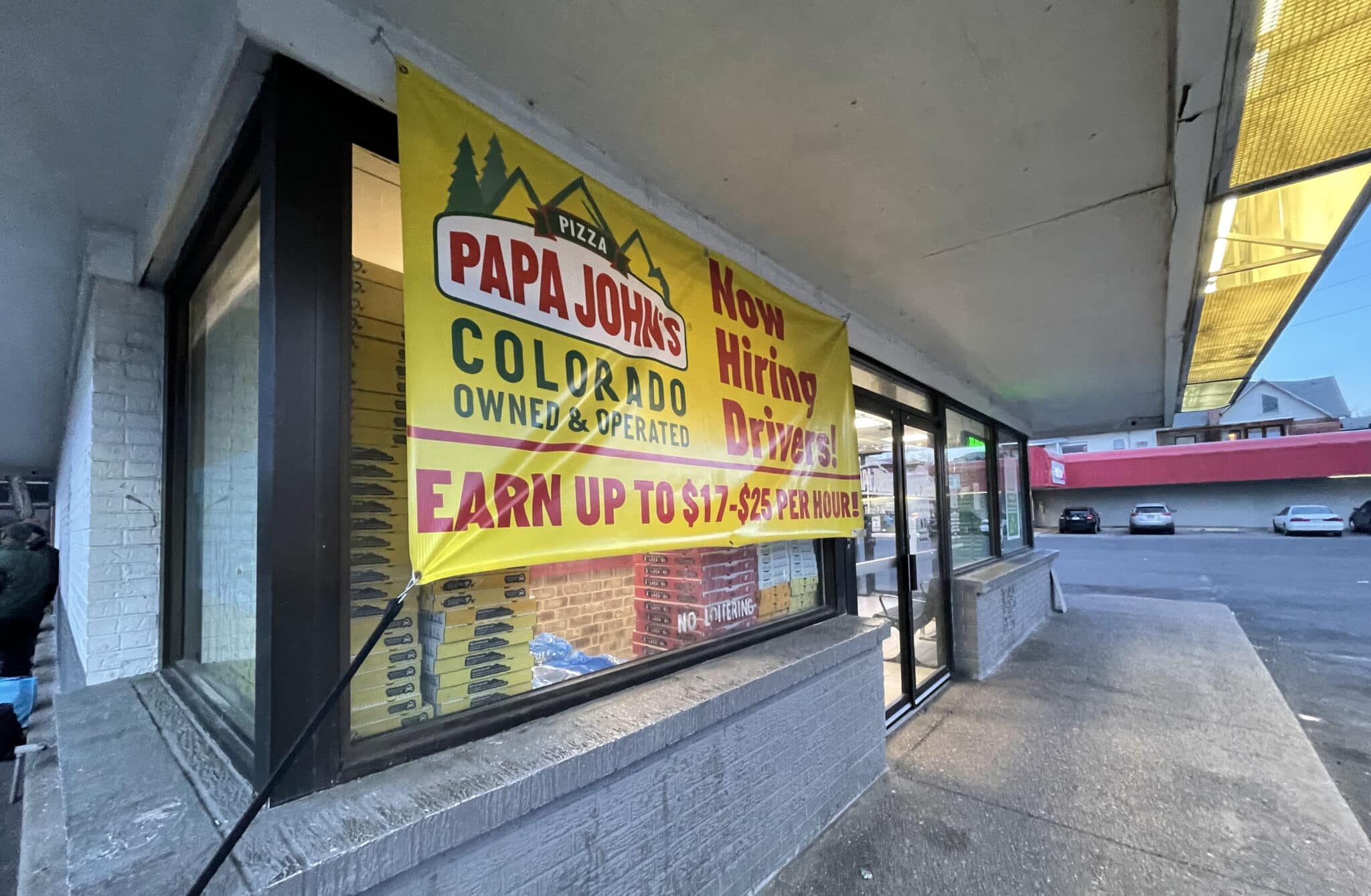
Denver’s minimum wage is rising to $17.29 an hour at the start of the new year, but some businesses are already offering more to attract new employees. (BusinessDen file photos)
High inflation means Denver’s minimum wage will jump nearly 9 percent on Jan. 1, from $15.87 to $17.29 an hour.
The city’s finance department announced the $1.42 increase on Tuesday.
The minimum wage for tipped food and beverage workers, meanwhile, will increase from $12.85 to $14.27, because employers can claim a $3.02 fixed “tip credit.” Those employers have to pay the regular minimum wage if employee tips don’t make up the difference.
Denver’s minimum wage was $11.10 an hour in 2019, the statewide minimum at the time. That November, however, the Denver City Council passed an ordinance increasing the minimum wage through three annual increases, to $15.87 this year.
Starting in 2023, the ordinance calls for the minimum wage to increase at the rate of the consumer price index, a measure of the average cost of goods and services in the market.
The finance department said it determined that the CPI for the Denver area increased 8.94 percent from the first six months of 2021 to the same period in 2022, so the minimum wage will increase at that rate as well.
“We know this will put additional burdens on our local businesses, but this is an important tool to support vulnerable workers across the city,” Mayor Michael Hancock said in a statement.
Not all businesses are thrilled about the coming increases in wages.
“For the majority of independent restaurants, if not all, this makes zero sense. And all it does is hurt them and put them out of business,” said Juan Padro, CEO and founder of Denver’s Culinary Creative Group, whose restaurants include Mister Oso and Bar Dough.
Padro said the increase will further the income gap between the front and back of the house.
He said he already pays back-of-house employees like dishwashers above the new minimum wage, so the increase won’t directly affect them.
But front-of-house employees like waiters will get a $1.42 an hour raise despite the fact that their tips mean they generally make significantly more than the back of the house.
“The intent is to try to do what’s best,” Padro said. “The decisions oftentimes don’t equate to what’s best because we don’t have people who really understand our industry.”
Padro noted that some restaurateurs have tried to address this by altering the typical tip model in two ways.
With tip pooling, everyone has a base minimum wage and tips are allocated via a point system. Second, and Padro’s preferred method, is a service charge. The income from the charge allows businesses the flexibility to pay the back of the house a higher and more fair wage, he said.
Here are the previous increases in Denver’s minimum wage in recent years. They did not correspond to the consumer price index.
• 2022: $15.87, up 7.4 percent compared to 2021
• 2021: $14.77, up 14.9 percent compared to 2020
• 2020: $12.85, up 15.8 percent compared to 2019

Denver’s minimum wage is rising to $17.29 an hour at the start of the new year, but some businesses are already offering more to attract new employees. (BusinessDen file photos)
High inflation means Denver’s minimum wage will jump nearly 9 percent on Jan. 1, from $15.87 to $17.29 an hour.
The city’s finance department announced the $1.42 increase on Tuesday.
The minimum wage for tipped food and beverage workers, meanwhile, will increase from $12.85 to $14.27, because employers can claim a $3.02 fixed “tip credit.” Those employers have to pay the regular minimum wage if employee tips don’t make up the difference.
Denver’s minimum wage was $11.10 an hour in 2019, the statewide minimum at the time. That November, however, the Denver City Council passed an ordinance increasing the minimum wage through three annual increases, to $15.87 this year.
Starting in 2023, the ordinance calls for the minimum wage to increase at the rate of the consumer price index, a measure of the average cost of goods and services in the market.
The finance department said it determined that the CPI for the Denver area increased 8.94 percent from the first six months of 2021 to the same period in 2022, so the minimum wage will increase at that rate as well.
“We know this will put additional burdens on our local businesses, but this is an important tool to support vulnerable workers across the city,” Mayor Michael Hancock said in a statement.
Not all businesses are thrilled about the coming increases in wages.
“For the majority of independent restaurants, if not all, this makes zero sense. And all it does is hurt them and put them out of business,” said Juan Padro, CEO and founder of Denver’s Culinary Creative Group, whose restaurants include Mister Oso and Bar Dough.
Padro said the increase will further the income gap between the front and back of the house.
He said he already pays back-of-house employees like dishwashers above the new minimum wage, so the increase won’t directly affect them.
But front-of-house employees like waiters will get a $1.42 an hour raise despite the fact that their tips mean they generally make significantly more than the back of the house.
“The intent is to try to do what’s best,” Padro said. “The decisions oftentimes don’t equate to what’s best because we don’t have people who really understand our industry.”
Padro noted that some restaurateurs have tried to address this by altering the typical tip model in two ways.
With tip pooling, everyone has a base minimum wage and tips are allocated via a point system. Second, and Padro’s preferred method, is a service charge. The income from the charge allows businesses the flexibility to pay the back of the house a higher and more fair wage, he said.
Here are the previous increases in Denver’s minimum wage in recent years. They did not correspond to the consumer price index.
• 2022: $15.87, up 7.4 percent compared to 2021
• 2021: $14.77, up 14.9 percent compared to 2020
• 2020: $12.85, up 15.8 percent compared to 2019

